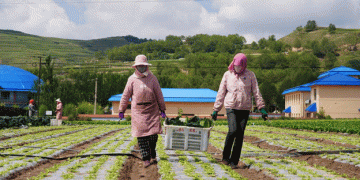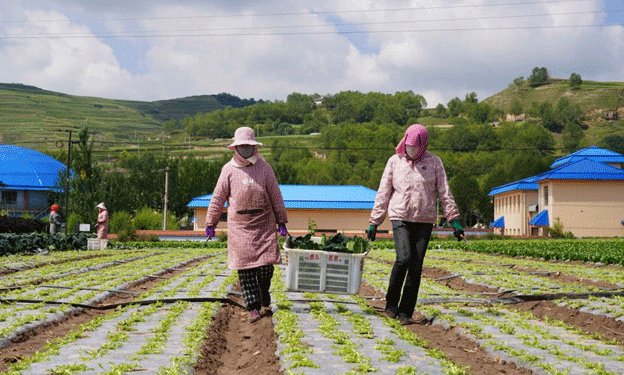In a remarkable turnaround, farmers in Qinghai’s Huuzhou County are now cultivating cool-climate vegetables that swiftly make their way to the bustling markets of Hong Kong and Macau. These efforts not only support local economies but also provide a blueprint for rural revitalization in high-altitude regions. With efficient supply chains and a focus on high-value crops, Qinghai is emerging as a key player in China’s agricultural landscape.
A New Agricultural Landscape
The journey of these vegetables from the Qinghai-Tibet Plateau to urban markets is both efficient and transformative. Farmers at the Runheng Planting Cooperative in Tangchuan Town, Huuzhou County, are currently cultivating 80 acres of cool-climate vegetables. According to Xi Henglu, the cooperative’s manager, “We can sell vegetable shoots for as much as 3.6 yuan per kilogram, and we are supplying 2 to 3 tons of vegetables weekly, but demand is outstripping supply.”
The unique climate of Huuzhou County, situated at an average altitude of 2,700 meters with an annual temperature of just 3.4 degrees Celsius, is ideal for cool-climate crops. “Many regions experience a peak growing season, but we can offer vegetables when others cannot,” explains Zhu Anxiang, director of the Vegetable Technology Service Center.
Expanding Market Opportunities
Recently, Qinghai’s first batch of cool-climate vegetables successfully entered the Macau market, following regular shipments to Hong Kong. This expansion is part of a larger trend where local producers adapt to market demands. Rinqing Cuo, head of the customs office at Xining Caojiabao Airport, emphasized that “we provide one-on-one support for vegetable export enterprises. In Huuzhou County alone, 17 companies have registered as vegetable production bases for Hong Kong and Macau.”
The local government has established a “green channel” for these exports, enabling smooth customs processes to facilitate timely deliveries to the Greater Bay Area, thus ensuring “zero delays” in transport.
Economic Impact on Local Farmers
Traditionally, many farmers in the region focused on crops like wheat and rapeseed, which yielded less than 2,000 yuan per acre annually. However, the rise of cool-climate vegetables has changed this narrative. As villager Li Shenglian noted, “In the past, I’d rather work elsewhere for better pay than stay tied to the land all year.”
In the neighboring Guizhou County, farmers have started cultivating red bamboo shoots, benefiting from the region’s favorable climate conditions. The area boasts large temperature differences between day and night and ample sunlight, allowing for high yields and multiple harvests throughout the growing season.
A Future of Sustainable Agriculture
Qinghai Province has developed a series of representative vegetable production bases, including those for producing vegetables for Hong Kong, allowing farmers to reap significant economic benefits. The total planting area for vegetables in Qinghai now exceeds 540,000 acres, with a production volume of over 530,000 tons and an estimated market value of around 4.7 billion yuan.
As local leaders, such as Yang Run, Party Secretary of the village of Laoyou in Honghezi Valley, explore ways to expand vegetable cultivation, the economic potential becomes clearer. “We’ve planted 160 acres of vegetables for Hong Kong, generating nearly 10,000 yuan per acre annually. Everyone is benefiting, and we must seize this opportunity to broaden income avenues,” Yang stated.
The rise of cool-climate vegetables from the Qinghai-Tibet Plateau marks a significant shift in agricultural practices and economic development for local farmers. By capitalizing on favorable climatic conditions and efficient supply chains, Qinghai is not only transforming its agricultural landscape but also enhancing the livelihoods of its rural communities. This success story serves as an inspiration for similar regions facing economic challenges.































